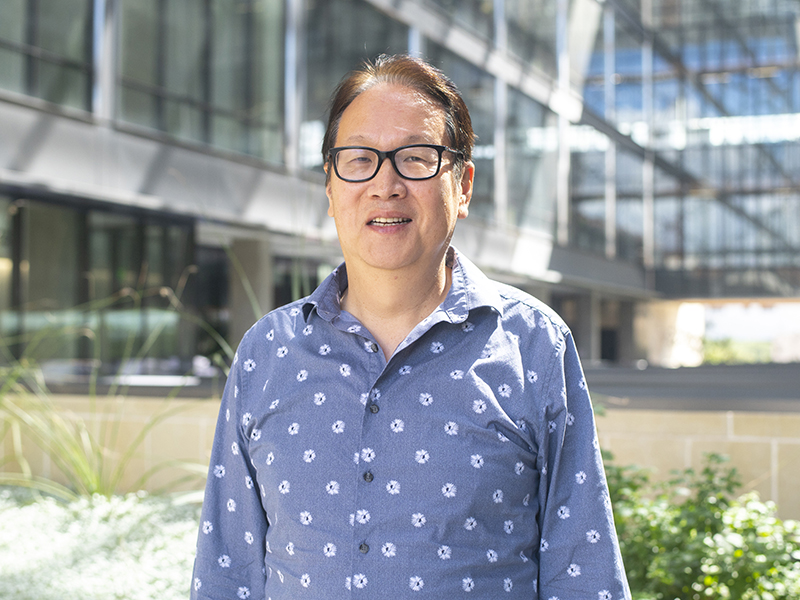Two faculty members from the Cockrell School of Engineering’s Chandra Family Department of Electrical and Computer Engineering have been elected Fellows of the National Academy of Inventors (NAI).
Professors Ray Chen and Al Bovik were chosen for "demonstrating a highly prolific spirit of innovation in creating or facilitating outstanding inventions that have made a tangible impact on the quality of life, economic development, and welfare of society.” Election to NAI Fellow status is the highest professional distinction accorded solely to academic inventors.
"This tremendous honor is a testament to the significance of the impact Al and Ray have made through their inventions," said Diana Marculescu, chair of the Chandra Family Department of Electrical and Computer Engineering. "They have long been pioneers in their fields, and we are so proud to be associated with Al, Ray and their extensive achievements."
Joining Bovik and Chen in this year’s NAI class from UT Austin is Lili Qui, a professor in the College of Natural Sciences’ Department of Computer Science. Her research focus is on internet and wireless networking, and she also holds an appointment in electrical engineering.
Founded in 2010, the National Academy of Inventors aims to recognize inventors with patents issued by the U.S. Patent and Trademark Office, with an overall emphasis on innovation that clearly benefits society. The induction ceremony for this year’s honorees will take place July 25-27, 2023.

Bovik holds the Cockrell Family Endowed Regents Chair in Engineering in the Chandra Family Department of Electrical and Computer, where he is director of the Laboratory for Image and Video Engineering (LIVE). He is also part of the Wireless Networking and Communication Group (WNCG) and the Institute for Neuroscience.
His work broadly focuses on creating new theories and algorithms that allow for the perceptually optimized streaming and sharing of visual media. The outcomes of his work have the benefits of ensuring the visual satisfaction of billions of viewers worldwide, while substantially reducing global bandwidth consumption. He has published over 1,000 technical articles in these areas and holds several U.S. patents.
Bovik has received a number of major international awards. These include: election to the prestigious National Academy of Engineering; a pair of Emmy Awards from the National Academy of Television Arts and Sciences in 2021 and 2015; The Progress Medal from the Royal Photographic Society (RPS) in 2019; The IEEE Fourier Award for Signal Processing in 2019; and The Edwin H. Land Medal from The Optical Society of America in 2017

Chen is the director of the Nanophotonics and Optical Interconnects Research Lab at UT Austin’s Microelectronics Research Center. He is the director of the AFOSR MURI-Center for Power-Efficient Silicon Nanophotonics for Optical Computing and Interconnects. From 2008 to 2013 he also led a MURI center for Silicon Nanomembrane involving faculty from Stanford, UIUC, Rutgers, and UT Austin. A myriad of commercially available devices and systems are available in the market from these basic research programs.
His research focuses on four main subjects: Nano-photonic passive and active devices for bio- and EM-wave sensing and interconnect applications; Thin film guided-wave optical interconnection, computing and packaging for 2D and 3D laser beam routing and steering; True time delay (TTD) wide band phased array antenna (PAA); and 3D printed micro-electronics and photonics. Chen has supervised 41 postdocs and graduated 56 PhD students from his research group at UT Austin. Many of them are currently professors in the major research universities in the world.
Chen served as the CTO, Founder, and Chairman of the Board of Radiant Research, Inc. from 2000 to 2001, where he raised $18 million to commercialize polymer-based photonic devices involving more than 20 patents, which were acquired by Finisar in 2002, a publicly traded company in Silicon Valley. He also serves as the founder and chairman of the Board of Omega Optics Inc., which has received more than $20 million in research funding, since its initiation in 2001. Omega Optics has received over $20 million in research funding from private sectors and government agencies
Chen’s group at UT Austin has reported its research findings in more than 970 publications, including more than 100 invited papers and 82 patents. He has chaired or been a program-committee member for more than 130 domestic and international conferences organized by IEEE, SPIE OSA, and PSC. He has served as an editor, co-editor or coauthor for over twenty books. Chen has also served as a consultant for various federal agencies and private companies and delivered numerous invited talks to professional societies. Chen is a Fellow of IEEE, OSA, and SPIE. He was the recipient of the 1999 UT Engineering Foundation Faculty Award, for his contributions in research, teaching and services. He received the honorary citizenship award in 2003 from the Austin City Council for his contribution in community service. He was also the recipient of the 2008 IEEE Teaching Award, the 2010 IEEE HKN Loudest Professor Award and the 2013 NASA Certified Technical Achievement Award for contribution on moon surveillance conformable phased array antenna.







